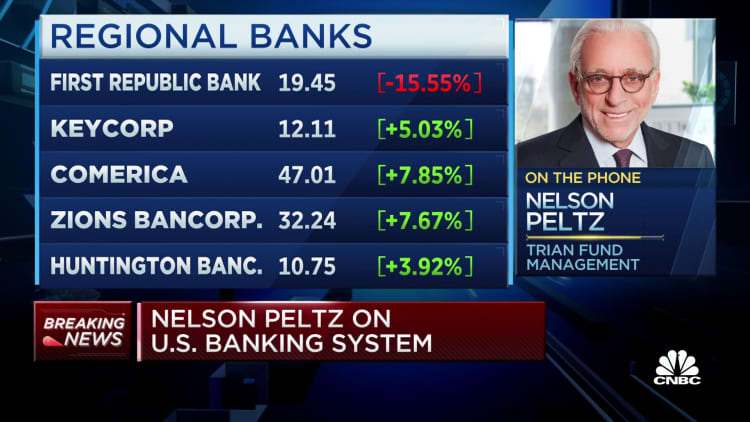The recent banking crisis has fueled concern of a "credit crunch" and the resulting negative impact on households, businesses and the U.S. economy.
But what is a credit crunch and how might you prepare?
Loans would be tougher to get
During a credit crunch, banks significantly tighten their lending standards.
Loans become tougher to get. Banks that offer them might do so with more onerous terms like high interest rates or other restrictions — making such financing more costly.
Overall, it becomes harder, for example, for households to buy cars and homes or fix their roofs, and for businesses to hire, expand and open new stores or factories. A cooling in bank lending flows down to the economy's bottom line, making a recession more likely.
More from Personal Finance:
What small businesses should look for when choosing a bank
What to know about FDIC insurance
What recent bank failures mean for consumers and investors
"Credit is the mother's milk of economic activity," said Mark Zandi, chief economist at Moody's Analytics.
"I'd be surprised if we don't see a pretty significant tightening of credit in the near term, among small and midsize banks," he added.
Of course, there must be a happy medium in a well-functioning economy, Zandi said.

Lending standards that are too loose can be damaging, too. During the financial crisis, for example, subprime mortgages issued en masse by banks triggered a housing crisis that ultimately cascaded into a deep recession.
Banks may prioritize a healthier balance sheet
A credit crunch seems likely given banking woes that have unfurled over the past two weeks.
Silicon Valley Bank and Signature Bank failed when depositors rushed to withdraw their money and the banks were unable to meet the cash demand.
Banks don't keep all customers' cash on hand. They make money off those deposits by investing some of the funds or lending it (and receiving interest payments).
Among SVB's problems was an investment in long-term U.S. Treasury bonds. SVB locked up billions of dollars in these bonds, which lost money as the Federal Reserve started raising interest rates aggressively last year to combat high inflation.
What this all means: To avoid a similar fate, many banks will likely prioritize shoring up their balance sheets to weather a potential bank run, experts said.
Banks might crimp lending in order to have more cash on hand to meet customer redemptions, for example. Also, if bank customers withdraw funds, a bank might then have a smaller stockpile from which to make loans.
"You're going to see a credit crunch happening in the U.S., and that's starting to get priced into the market in a dramatic way," Mike Novogratz, CEO of Galaxy Digital, an investment management firm, said in an interview with CNBC's "Squawk Box" last week.
A severe credit crunch isn't a foregone conclusion, though.
The extent of the banking contagion remains unclear, Zandi said. The nation's largest banks are also unlikely to significantly change their lending behavior, he added.
Banks had already been clamping down
Banks had been reducing the flow of credit to businesses and households even prior to the recent mayhem.
In the fourth quarter, banks reported tightening their standards for credit cards, home equity lines of credit, auto loans and other consumer loans, according to the Federal Reserve's latest Senior Loan Officer Opinion Survey. They reported increasing the minimum credit scores required to secure such loans, for example.
A significant share also tightened standards for commercial and industrial lending to businesses, the survey said.
"I think many banks would naturally be looking to potentially [tighten standards] given worries about a recession, even without these banking issues that have come to the fore recently," said Christine Benz, director of personal finance at Morningstar.
How to prepare for a credit crunch
There are some steps consumers can take now to prepare for a possible credit crunch.
If you have a looming credit need, make sure your creditworthiness is "as attractive as can possibly be the case," Benz said.
That might include ensuring you pay credit card bills and other debt payments in full and on time each month; reducing your credit utilization rate; or requesting a credit report and disputing any errors.
Businesses with loans that are nearing the end of their term should try to figure out how to refinance the loan or roll it over "sooner rather than later," Zandi said.
Consumers should also shore up their "personal balance sheet" in case tighter credit were to trigger an economic downturn, Benz said. Ensure you have the cash on hand in an emergency reserve to weather potential joblessness, for example, she said.
Those reserves might be stored in an emergency cash fund, for example. A secondary line of reserves might come from setting up a home equity line of credit now and having it on standby in the event of job loss, Benz said.
Having three to six months of reserves to cover household essentials is a good starting point, she said. Older working adults and those in more specialized career paths may need more — closer to a years' worth — since it might take longer to replace a lost job, Benz added.
Consumers should be aware that banks often retain the right to reduce the credit limit on existing HELOCs, said Allan Roth, a certified financial planner and accountant based in Colorado Springs, Colo.
Bank customers should also try to keep their savings at any one bank within the Federal Deposit Insurance Corporation limit of $250,000 per depositer, per ownership category, Roth said. The federal government backstopped uninsured deposits at SVB and Signature Bank, but that won't necessarily be the case for future bank failures.


